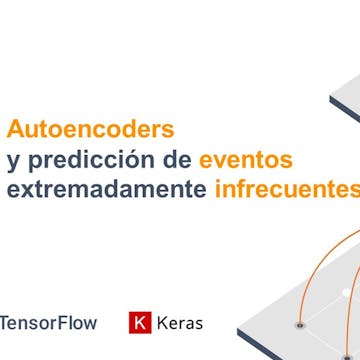
Good to know
Save this course
Activities
Review Autoencoder Basics
Show steps
Improve understanding of Autoencoders and Neural Networks, creating a strong foundation for the course.
Browse courses on
Autoencoders
Show steps
-
Revisit the basics of Neural Networks.
-
Explore different types of Autoencoders.
-
Implement a simple Autoencoder in a programming language.
Create a Comprehensive Study Guide
Show steps
Improve retention and recall by organizing notes, assignments, and other materials into a cohesive study resource.
Browse courses on
Study Guide
Show steps
-
Gather all relevant course materials.
-
Review and summarize key concepts, definitions, and examples.
-
Create a structured outline or mind map to organize the information.
-
Add visual aids, such as diagrams or charts, to enhance understanding.
Create a Visual Guide to Autoencoder Architecture
Show steps
Solidify understanding of Autoencoder architecture by creating a visual representation, enhancing conceptual clarity.
Show steps
-
Gather information about Autoencoder architecture.
-
Design a visual representation using a tool like draw.io or Lucidchart.
-
Label and annotate the diagram to explain the components and flow of the Autoencoder.
Four other activities
Expand to see all activities and additional details
Show all seven activities
Follow Guided Tutorials on Autoencoder Implementations
Show steps
Gain practical experience implementing Autoencoders using popular frameworks, reinforcing course concepts.
Browse courses on
TensorFlow
Show steps
-
Identify online tutorials for implementing Autoencoders.
-
Choose a framework (e.g., TensorFlow, Keras) and follow the tutorial.
-
Experiment with different Autoencoder architectures and parameters.
Solve Practice Problems on Autoencoder Training
Show steps
Develop problem-solving skills and deepen understanding of Autoencoder training techniques, enhancing comprehension of course material.
Browse courses on
Loss Functions
Show steps
-
Locate practice problems related to Autoencoder training.
-
Attempt to solve the problems using course knowledge.
-
Analyze solutions and identify areas for improvement.
-
Experiment with different training parameters and observe their impact on Autoencoder performance.
Attend a Workshop on Autoencoder Applications
Show steps
Gain insights into practical applications of Autoencoders, broadening knowledge and understanding.
Browse courses on
Image Processing
Show steps
-
Identify relevant workshops on Autoencoder applications.
-
Register and attend the workshop.
-
Actively participate in discussions and ask questions to clarify concepts.
-
Connect with experts and practitioners in the field.
Participate in an Autoencoder Competition
Show steps
Challenge oneself, test skills, and gain valuable experience in applying Autoencoders to real-world problems.
Browse courses on
Kaggle
Show steps
-
Identify and register for an Autoencoder competition.
-
Develop and implement an Autoencoder solution.
-
Submit the solution and track progress on the leaderboard.
-
Analyze results and identify areas for improvement.
Review Autoencoder Basics
Show steps
Improve understanding of Autoencoders and Neural Networks, creating a strong foundation for the course.
Browse courses on
Autoencoders
Show steps
- Revisit the basics of Neural Networks.
- Explore different types of Autoencoders.
- Implement a simple Autoencoder in a programming language.
Create a Comprehensive Study Guide
Show steps
Improve retention and recall by organizing notes, assignments, and other materials into a cohesive study resource.
Browse courses on
Study Guide
Show steps
- Gather all relevant course materials.
- Review and summarize key concepts, definitions, and examples.
- Create a structured outline or mind map to organize the information.
- Add visual aids, such as diagrams or charts, to enhance understanding.
Create a Visual Guide to Autoencoder Architecture
Show steps
Solidify understanding of Autoencoder architecture by creating a visual representation, enhancing conceptual clarity.
Show steps
- Gather information about Autoencoder architecture.
- Design a visual representation using a tool like draw.io or Lucidchart.
- Label and annotate the diagram to explain the components and flow of the Autoencoder.
Follow Guided Tutorials on Autoencoder Implementations
Show steps
Gain practical experience implementing Autoencoders using popular frameworks, reinforcing course concepts.
Browse courses on
TensorFlow
Show steps
- Identify online tutorials for implementing Autoencoders.
- Choose a framework (e.g., TensorFlow, Keras) and follow the tutorial.
- Experiment with different Autoencoder architectures and parameters.
Solve Practice Problems on Autoencoder Training
Show steps
Develop problem-solving skills and deepen understanding of Autoencoder training techniques, enhancing comprehension of course material.
Browse courses on
Loss Functions
Show steps
- Locate practice problems related to Autoencoder training.
- Attempt to solve the problems using course knowledge.
- Analyze solutions and identify areas for improvement.
- Experiment with different training parameters and observe their impact on Autoencoder performance.
Attend a Workshop on Autoencoder Applications
Show steps
Gain insights into practical applications of Autoencoders, broadening knowledge and understanding.
Browse courses on
Image Processing
Show steps
- Identify relevant workshops on Autoencoder applications.
- Register and attend the workshop.
- Actively participate in discussions and ask questions to clarify concepts.
- Connect with experts and practitioners in the field.
Participate in an Autoencoder Competition
Show steps
Challenge oneself, test skills, and gain valuable experience in applying Autoencoders to real-world problems.
Browse courses on
Kaggle
Show steps
- Identify and register for an Autoencoder competition.
- Develop and implement an Autoencoder solution.
- Submit the solution and track progress on the leaderboard.
- Analyze results and identify areas for improvement.
Career center
Research Scientist
Quantitative Analyst
Machine Learning Engineer
Fraud Analyst
Data Scientist
Data Architect
Risk Analyst
Professor
Actuary
Database Administrator
Software Engineer
Business Intelligence Analyst
Technical Writer
Consultant
Data Analyst
Reading list
Share
Similar courses
OpenCourser helps millions of learners each year. People visit us to learn workspace skills, ace their exams, and nurture their curiosity.
Our extensive catalog contains over 50,000 courses and twice as many books. Browse by search, by topic, or even by career interests. We'll match you to the right resources quickly.
Find this site helpful? Tell a friend about us.
We're supported by our community of learners. When you purchase or subscribe to courses and programs or purchase books, we may earn a commission from our partners.
Your purchases help us maintain our catalog and keep our servers humming without ads.
Thank you for supporting OpenCourser.



